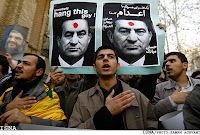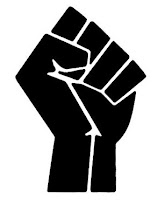
Six suggestions:
1. Slavoj Žižek, “Why Fear the Arab Revolutionary Spirit?”
In this essay Žižek takes to task those western liberals who are too cautious in their support of the Egyptian revolutionaries and protestors in other nations, arguing that such a move will repeat the mistakes of the past, when western help in shutting down Arab socialism helped give rise to Muslim fundamentalism. He concludes his little op-ed:
The hypocrisy of western liberals is breathtaking: they publicly supported democracy, and now, when the people revolt against the tyrants on behalf of secular freedom and justice, not on behalf of religion, they are all deeply concerned. Why concern, why not joy that freedom is given a chance? Today, more than ever, Mao Zedong’s old motto is pertinent: “There is great chaos under heaven – the situation is excellent.” Where, then, should Mubarak go? Here, the answer is also clear: to the Hague. If there is a leader who deserves to sit there, it is him.
2. John Summers, “Daniel Bell and The End of Ideology”
In this timely retrospective, Summers wonders why a book that categorized the death knell of socialist utopia is still considered so important. Here’s a glimpse:
What is the legacy of The End of Ideology today? I think it lies in the sober, anti-romantic, wiser-than-thou style of political analysis and leadership on display on the night of January 25, hours after Bell died, in Barack Obama’s State of the Union speech. “Obama aims to realize the end-of-ideology politics that Daniel Bell and others glimpsed,” David Brooks opined in 2009, as if every Democratic president since John F. Kennedy has not feared an uprising from the Left, after the Left put them in power. Two years into Obama’s administration, the ironies and fatuities of the style deserve to be clearly stated. While the president claims the post-ideological, responsible center, he stands accused of promulgating socialism by Americans who have no memory, and little understanding, of socialist ideology; the electorate fights over party dogmas awkwardly labeled neoconservative and neoliberal; civic discourse runs thick with empty rhetoric of rebellion and revolution, interrupted by sporadic episodes of passionless violence; and political society, long lacking the New Deal consensus assumed by Bell and his cohorts, swings from apathy to protest and back again.
And a little more from this piece on how Bell’s anti-ideology might have acted as the intellectual correlative of anti-politics, which might help us come to terms with whether or not Bell was a neoconservative:
But if ideology had ended, then how could “the reader” judge the contributions of The End of Ideology? Was Bell a neoconservative, his book an early signpost for the neoconservative path? He rejected the label, though not because he felt free of conservatism. In a minor paradox that gave his book its polemical energy, he claimed that his thesis exempted him from all labels, that he spoke from a nameless position beyond ideology. The neoconservative “designation is meaningless,” he insisted—not wrong, mind you, but “meaningless.” His book represented a “new cultural criticism” that “seeks to transcend the lines of the present debates and to present the dilemmas of the society within a very different framework.” In place of closed ideologies and forgone conclusions, he mated the spirit of openness with the discipline and tentativeness of new facts. In place of wild passion, he embraced “the hardness of alienation, the sense of otherness.”
3. Check out Nemo’s excellent review of Daniel Rodgers, The Age of Fracture at the PhD Octopus blog.
Although it is obvious that Nemo mostly likes the book, he does question one of Rodgers’s central claims, that intellectuals in the age of disaggregation quit thinking about limits placed upon people by power, instead thinking about the limitlessness of human agency. Nemo writes:”Is this really the case though? Is it true that thinkers such as Cornel West and Judith Butler really had less of a concern with institutions, history, and power than their predecessors?”
Actually, Rodgers does make one glaring exception to his rule: race. In his Chapter Four, “Race and Social Memory,” he contends that though many sought liberation from the past in their optimistic attempts to re-imagine a limitless future—a postmodern future where power was inoperative—blacks could not escape the confines of power and history, written as they were onto their skin. So instead of seeking to escape history, they sought to flip it to their advantage. Black became a source of pride, history a point of continuity.
This leads me to my next reading suggestion:

4. Peniel E. Joseph, Waiting ‘Til the Midnight Hour: A Narrative History of Black Power in America.
I just read this book for the first time alongside a class of undergraduate students. I found it beautifully written and cogently argued. It’s more political and biographical than intellectual history, though Joseph does pause to analyze key texts such as Harold Cruse’s The Crisis of the Negro Intellectual. In short, I highly recommend this book.
5. Bill McKibben, “Catastrophic Weather Events Are Becoming the New Normal — Are You Ready for Life on Our Planet Circa 2011?”
This is short. But I found it to be good ammunition for those illogical people in your lives who make the fallacious argument that the cold weather and storms we’re experiencing refute global warming. (This coming from someone who spent two hours digging out my car on Wednesday.)
6. Ben Alpers, “Neoliberalism (Slight Return)”
In the hopes of rescuing this post from getting lost in the shuffle, please check out what I guess might be the last post on our long debate about neoliberalism. In conclusion, Ben and I agree on this important matter (which I wrote in my previous post):
“The neoliberalism (us) that Ben dug up for us—the neoliberalism of 1980s Democrats like Gary Hart—is a relatively important aspect of recent political history, but is not all that important in most larger contexts.”
Happy Friday!

4 Thoughts on this Post
S-USIH Comment Policy
We ask that those who participate in the discussions generated in the Comments section do so with the same decorum as they would in any other academic setting or context. Since the USIH bloggers write under our real names, we would prefer that our commenters also identify themselves by their real name. As our primary goal is to stimulate and engage in fruitful and productive discussion, ad hominem attacks (personal or professional), unnecessary insults, and/or mean-spiritedness have no place in the USIH Blog’s Comments section. Therefore, we reserve the right to remove any comments that contain any of the above and/or are not intended to further the discussion of the topic of the post. We welcome suggestions for corrections to any of our posts. As the official blog of the Society of US Intellectual History, we hope to foster a diverse community of scholars and readers who engage with one another in discussions of US intellectual history, broadly understood.
Good stuff! Thanks. But, on your first entry, shouldn’t Zizek be taking Western ~conservatives~ to task (neo and otherwise)? Or is he using the term “liberal” in a general-vein-of-the-Western-Enlightenment sense? At least the neoliberals (are there any liberals left?) are proceeding to a cautionary, deliberate support for a revolution they hope sustains itself, whereas American conservatives are doing calisthenics to maintain “stability.” – TL
Tim: Zizek has always bludgeoned liberalism with a sledge hammer, as opposed to careful surgery with a scalpel. It’s part of his charm as a provocateur. Tony Blair is a stand-in for the liberal reaction to Egypt in this article. He writes: “the most shameful and dangerously opportunistic reaction was that of Tony Blair as reported on CNN: change is necessary, but it should be a stable change. Stable change in Egypt today can mean only a compromise with the Mubarak forces by way of slightly enlarging the ruling circle. This is why to talk about peaceful transition now is an obscenity: by squashing the opposition, Mubarak himself made this impossible. After Mubarak sent the army against the protesters, the choice became clear: either a cosmetic change in which something changes so that everything stays the same, or a true break.”
But I think you’re right that it’s important to also note the conservative response. I keep waiting for neoconservatives to trumpet these revolutions as evidence of the Bush doctrine’s success. I think the only thing standing in the way of such nonsense is the fact that the situation in Egypt portends uncertain consequences for Israel.
Andrew: This article from Slate addresses your last (feared) point: Fred Kaplan’s “Does Egypt Prove Bush Right? No, his ‘freedom agenda’ failed long before he left office.” (http://www.slate.com/id/2283756/). – TL
I agree with Kaplan: the revolts in the Middle East happened despite the grand plan of W to end tyranny around the world. These revolts in a historical sense mock the anti-historical notion that Bush floated. I wonder if we are indeed coming to a point at which we simply accept the notion that the US has played a role in world affairs as a neo-liberal force far more effectively than anything approaching a force for democracy, freedom, etc. And if that is the case, what shall we make of all that chatter about democracy that has dominated the ranks of political scientists and historians since the late 19th century. We might all shrug at the idea that we ever accepted the End of History thesis, but there is still a great deal of traffic regarding attempts to make democracy the touchstone for understanding history’s arc.